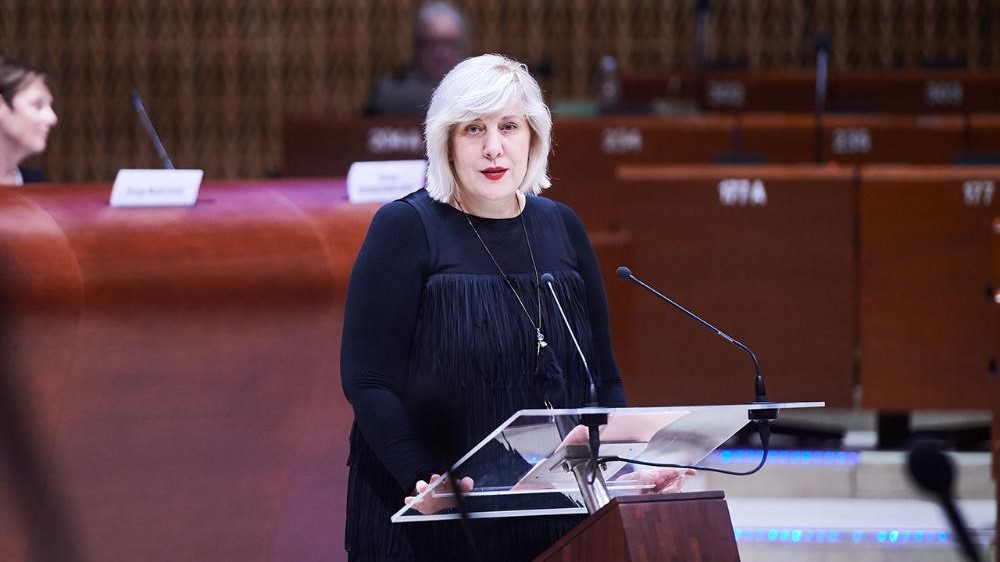In her video message to the Conference “Joint Steps to Bring Kids Back UA”, organised by the Ukrainian Parliament Commissioner for Human Rights in Kyiv on 8 December 2023, the Council of Europe Commissioner for Human Rights, Dunja Mijatović denounced Russia’s failure to return Ukrainian children as a serious violation of human rights.
"The human rights situation of Ukrainian children transferred to Russia or to territories of Ukraine temporarily occupied by Russia has been a top priority for my Office since the earliest reports of the transfers emerged.
Since the beginning of the war, I have been consistent in calling on Council of Europe member states to keep this issue on top of their agendas.
I have devoted to this issue a part of my Memorandum on the human rights consequences of the war in Ukraine.
This year, in March, I came to Ukraine again for a country visit focused specifically on this issue.
In my observations after the visit, I denounced Russia’s failure to return Ukrainian children as a serious violation of human rights.
And I called for urgent action and international co-operation to ensure the family reunification of the affected children.
And this message has been voiced clearly by member states in the Reykjavik Summit Declaration on the situation of the children of Ukraine.
Ahead of today’s discussions, I would like to say two things.
First, I would like to acknowledge the crucial role played by organisations and networks of human rights defenders and civil societies, in Ukraine and in Russia, in facilitating the returns of Ukrainian children.
Much of this work is fraught with difficulty, and it is often done at a considerable personal risk to those involved.
I also wish to welcome the Ukrainian Ombudsman office’s role in providing support to the children and their families.
Without the determination and commitment of all those involved, it would be impossible to navigate the long and winding road to bring the children back.
Now, news of every successful return brings great relief.
Several hundred children have been reunited with their close ones, in Ukraine.
While these successes remind us of the power of cooperation in the face of adversity, we must remember that many others have not been so lucky.
Thousands more children, vulnerable and often powerless, remain separated from their families and legal guardians.
And the clock is ticking.
Therefore, my second message is one of urgency.
Each passing day weakens the children’s links with their families and complicates their eventual reunification.
Each passing day means more suffering for children longing to embrace their close ones.
And with each passing day, the hope of their return becomes more elusive.
We must not lose that hope.
Therefore, I am encouraged by the creation of the International Coalition of Countries for the Return of Ukrainian Children.
I hope that this new initiative will live up to its stated ambition to identify concrete and practical steps to support Ukraine in bringing back the children.
I also welcome the establishing of the Ad Hoc Committee to participate in a co-operation activity on “The situation of the children of Ukraine” by the Bureau of the Parliamentary Assembly of the Council of Europe.
And as for my own role, I intend to continue working with civil society organisations involved in facilitating the children’s returns to see how Council of Europe member states can better support their action.
Together, let us keep doing our utmost to bring all Ukrainian children back home", said the Commissioner.
In a report on Italy, published on 14 December 2023, Commissioner Mijatović recommended adopting a number of measures to better uphold the rights of migrants, asylum seekers and women. The Commissioner also raises certain issues concerning journalists and the legal protection of LGBTI people.
Stressing the need for a shared European responsibility to save lives at sea and recognising Italy’s efforts in this area, the Commissioner urges the Italian authorities to ensure adequate search and rescue capacity and calls for the repeal of legislation and policies that hamper NGO search and rescue operations.
Cooperation activities that directly or indirectly lead to returns to Libya should be suspended, in view of the grave and systematic human rights violations taking place there. Cooperation with other countries, in particular Tunisia, should be conditional on comprehensive human rights safeguards, and no returns should take place without a proper individual assessment. The Commissioner also warns of the lack of adequate human rights safeguards in the Memorandum of Understanding concluded with Albania and recommends that the Italian authorities prioritise improving the domestic asylum and reception systems.
While welcoming Italy’s progress in promoting gender equality and combating violence against women, the Commissioner notes a marked contrast between the legal framework and the inequalities, discrimination and violence faced by women and girls. To close this gap, she recommends that the authorities reduce regional disparities, combat sexism and gender stereotypes and improve support services for victims of gender-based violence.
The Commissioner calls for stronger enforcement of anti-discrimination laws and greater efforts to improve women’s socio-economic situation. She also urges the authorities to ensure women’s and girls’ unhindered access to sexual and reproductive health services, including abortion care and contraception, and stresses the need to respect and uphold women’s rights, dignity and autonomy in maternal health care.
Criminal law should also be amended to base sexual violence offences, including rape, on the notion of freely given consent. In addition, the Commissioner calls for increased efforts to prevent gender-based violence and for more training of judicial and law enforcement personnel to improve their treatment of women victims of gender-based violence and prevent secondary victimisation.
Finally, the Commissioner recommends the decriminalisation of defamation, the establishment of a national human rights institution and the broadening of legislation against discrimination, hate crime and hate speech to cover the rights of LGBTI people.
The report is based on the Commissioner's visit to Italy from 19 to 23 June.
- Read the Commissioner's report on Italy following her visit to the country in June 2023
- Read the comments of the Italian authorities on the Commissioner's report on Italy
On 4 December, in a letter addressed to the Minister of Interior of Finland, Mari Rantanen, the Council of Europe Commissioner for Human Rights, Dunja Mijatović, raised concerns about the rights of refugees, asylum seekers and migrants following the temporary closure of Finland’s Eastern land border.
While acknowledging concerns about the potential instrumentalisation by the Russian Federation of the movement of asylum seekers and migrants, “it is crucial that Council of Europe member states, even when dealing with challenging situations at their borders, react in a manner that fully aligns with their human rights obligations”, writes the Commissioner.
The Commissioner expressed her concern that decisions to restrict and subsequently close access to the border may impact notably on the right to seek asylum, as well as the principle of non-refoulement and prohibition of collective expulsion. She askd for several clarifications on safeguards implemented and measures taken to ensure human rights protection, and to prevent a humanitarian crisis from unfolding in the context of worsening weather conditions at the border.
The letter followed up on previous dialogue regarding legislative amendments allowing the Finnish government to restrict access to the border and concentrate applications for international protection at one or more crossing points.




